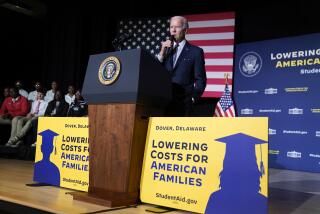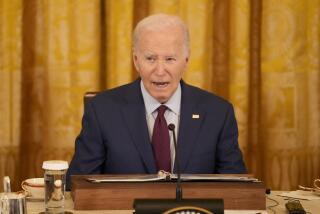Joint panel agrees to end TARP early to help pay for financial reform
Reporting from Washington — Moving swiftly to save the sweeping overhaul of financial regulations, congressional negotiators hastily reconvened Tuesday and agreed to pay for the increased regulation largely by putting an immediate end to the $700-billion bank bailout fund and using the savings to offset the costs of the reform package.
By stopping additional payments from the Troubled Asset Relief Program a little more than three months before it formally ends, the proposal would save $11 billion. That would cover most of the projected $19-billion cost of the reforms over 10 years.
The proposal, crafted by Senate Banking Committee Chairman Christopher J. Dodd (D-Conn.), would reduce the TARP fund to $475 billion — roughly the amount that has been spent so far — and would prohibit any new disbursements.
“It effectively ends the TARP program,” Dodd told the joint conference committee that reconciled different versions of the financial regulatory overhaul passed by the House and the Senate.
To cover the remaining cost of the reform package, Dodd’s plan also would increase the premiums that banks with more than $10 billion in assets pay for federal deposit insurance, administered by the Federal Deposit Insurance Corp.
FDIC Chairwoman Sheila C. Bair told the committee that she supported the plan, which would help strengthen the bank-financed insurance fund, depleted because of the failure of 254 institutions since the financial industry meltdown began in 2007.
Republicans on the conference committee slammed Dodd’s proposal as a “budget gimmick,” “accounting chicanery” and a “bait and switch” that would prevent unspent TARP money from being used to reduce the deficit — even though they would welcome an end to the bailout fund.
“This is fraud on the American taxpayer,” said Sen. Judd Gregg (R-N.H.). The conference committee defeated his counterproposal to pay for the legislation with unspent fiscal stimulus money.
Nearly all Republicans strongly oppose the wide-ranging strengthening of government regulation of Wall Street, designed to prevent a repeat of the financial crisis. House Minority Leader John A. Boehner (R-Ohio) on Tuesday compared the legislation to “killing an ant with a nuclear weapon.”
The House could vote on the revised legislation as early as Wednesday. A hoped-for Senate vote this week is likely to be delayed because of the death of Sen. Robert C. Byrd (D- W.Va.). His replacement would be needed to help the Democrats pass the legislation but is unlikely to be named this week.
Dodd said he believed the changes would secure Senate approval of the legislation.
The financial reform bill, the top legislative priority of President Obama, was in danger of failing to pass the Senate because of a last-minute provision added by congressional negotiators early Friday to assess large financial institutions a total of $19 billion over 10 years.
A key Republican supporter of the legislation, Sen. Scott Brown (R-Mass.), said he would not vote for the bill because of the fee. Another Republican supporter, Sen. Susan Collins (R-Maine) also said she was concerned about the fee.
With no votes to spare in the Senate, Dodd had to seek another way to offset the bill’s cost. Simply removing the $19-billion fee would cause problems in the House, where a group of fiscally conservative Democrats could withhold their support because the legislation would add to the huge federal deficit.
“I gather from a number of people they like this option,” Dodd told reporters Tuesday as he continued to negotiate with lawmakers on the plan. “We’re very, very close, and my hope is with this we can do it.”
Dodd said that most of his colleagues support “the complete and immediate elimination of the TARP program.” Under law, TARP expires in October, meaning no new expenditures could be made from the fund.
Brown could not be reached for comment. Earlier Tuesday, he sent a letter to Dodd and House Financial Services Committee Chairman Barney Frank (D-Mass.) saying he would vote against the bill if the fee remained.
“While some will try to argue this isn’t a tax, this new provision takes real money away from the economy, making it unavailable for lending on Main Street, and gives it to Washington. That sounds like a tax to me,” Brown wrote, referring to the existing provision.
“This tax will be paid by consumers who will have to pay higher fees and the small businesses that won’t get the funding they need to invest and create jobs,” he wrote.
Dodd and other Democrats touted the plan to use TARP as finding a way around a fee increase on large financial institutions and putting an early end to the controversial bailout fund. Republicans, in particular, have criticized the bailout fund and have called for its end since last year.
But they strongly objected to using TARP money to offset the cost of the bill.
“This is the kind of accounting that would make Bernie Madoff blush,” said Rep. Jeb Hensarling (R-Texas).
Although the administration has announced no new plans to spend additional TARP money, the Congressional Budget Office has assumed some additional expenses in its budget deficit projections. The administration’s latest projection for TARP losses is $105.4 billion.
The Treasury Department announced this month that the amount of money from the fund repaid by banks had for the first time surpassed the outstanding balance. As of May 31, repayments totaled $194 billion, topping the $190 billion in bailout money still outstanding.
In all, 707 banks in the U.S. received $205 billion in 2008 and 2009. An additional $331 billion was committed to other programs, including bailouts of General Motors Co. and Chrysler Group, as well as expanded rescues of Citigroup Inc., Bank of America Corp. and insurer American International Group Inc.
As the economy has recovered, 71 banks have repaid all of their TARP money.
More to Read
Sign up for Essential California
The most important California stories and recommendations in your inbox every morning.
You may occasionally receive promotional content from the Los Angeles Times.












